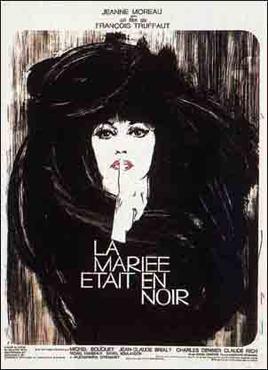
What happens when one acclaimed director deliberately styles his film after another? That is one question answered by The Bride Wore Black, François Truffaut's tribute to Alfred Hitchcock. Although the two directors worked in very different genres and styles (not to mention countries), they had great admiration for each other's work - Truffaut even published a book of his interviews with Hitchcock. But imitation is the sincerest form of flattery, and Truffaut decided to film a deliberately Hitchcockian thriller. The resulting film is not as inventive or influential as some of Truffaut's other films, like The 400 Blows or Shoot the Piano Player, nor does it rise to the heights of Hitchcock's greatest films. But it is a perfectly effective and clever little film about a woman set on revenge at any cost.
We are first introduced to the titular bride, Julie Kohler (Jeanne Moreau), when her mother foils her clumsy suicide attempt. Soon after, she leaves on a revenge mission to kill the five men who accidentally shot her husband. This motive is not revealed immediately - Truffaut makes an effective use of flashbacks at different stages in the story to slowly reveal the connections between the men, and to display the awful truth behind what happened that wedding day.
Hitchcock's influence is readily apparent throughout The Bride Wore Black. The plot itself is pure Hitchcock, and Jeanne Moreau's icy protagonist (or antagonist, depending on how you see it) would be perfectly at home in any of his films. The movie is also stylistically similar to much of Hitchcock's work, using bright colors and employing a Bernard Herrmann score (Herrmann was Hitchcock's main composer). Individual scenes, as well, struck me as possible homages. The first victim's death (by plunging from a high building) is rather clumsily filmed, but no doubt inspired by Vertigo. And a scene at a classical concert struck me as a possible nod to the climax of The Man Who Knew Too Much. But beyond any superficial homages, The Bride Wore Black is most closely related to Hitchcock in the way it finds the terrifying in the ordinary. Like Hitchcock, Truffaut establishes his characters very slowly. A scene at the beginning, where two friends are conversing about women and love, reminded me of The Birds, which is basically a romance story before the bird attacks ravage the town. Similarly, Truffaut establishes a seemingly banal setting and then startles us by introducing violence.
The Bride Wore Black may be effective as an homage, but it is not as effective as a thriller unto itself. At times the film limps on rather slowly without much of a point. There is one scene that achieves a high level of suspense, but there are few genuinely frightening moments. Perhaps I am wrong, though, in even classifying the film as a thriller. One could easily argue that the movie is a black comedy. Many scenes have an ironic or even comic overtone, particularly the brilliant final scene.
The Bride Wore Black is a modest little film. It was not career-defining for Truffaut, nor will it be life-changing for anybody. It was, perhaps, more of an experiment for Truffaut than anything. But the film has its fair share of merits. It is an entertaining revenge film, anchored by a strong lead performance, capped off with a nice dose of black humor.
Verdict: B
No comments:
Post a Comment